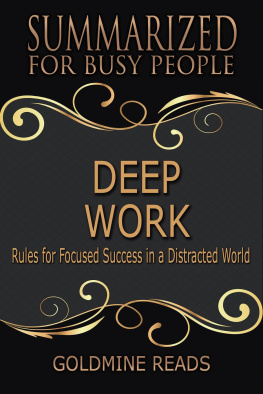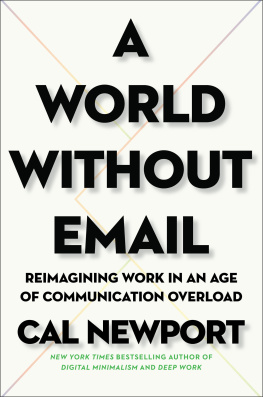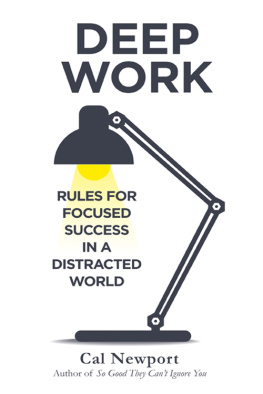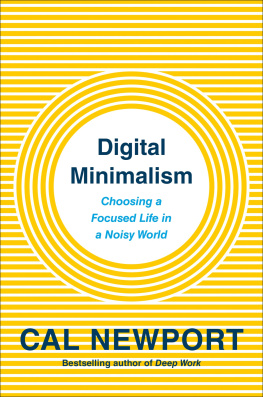DEEP WORK
Summarized For Busy People
Rules for Focused Success in a Distracted World
Based on the Book by Cal Newport
Goldmine Reads
Copyright Goldmine Reads
All Rights reserved. No part of this text may be reproduced, stored in a retrieval system, or transmitted, in any form or by any means, without the prior permission in writing of the copyright holder.
Under no circumstances will any legal responsibility or blame be held against the publisher for any reparation, damages, or monetary loss due to the information herein, either directly or indirectly.
Respective authors own all copyrights not held by the publisher.
TABLE OF CONTENT
D eep work pertains to functioning in a state of absolute concentration with no distractions. Such conditions enable maximization of ones cognitive capacity, and thus stimulate better performance for the task at hand. For example, take Carl Jung and his frequent retreats to the Bollingen Tower. Jung often departed from his normal routine and sought sanctuary in a village near Lake Zurich. Bollingen was where Jung retreated to keep away from the distractions of his daily life. This retreat, however, was not a holiday getaway. Jung used these times alone with himself to concentrate on his work. Such method allowed Jung to produce comprehensive analyses and eventually establish his renowned school of thought analytical psychology. He employed the concept of deep work and thus made great advances on his career.
Carl Jung was not the only genius to apply the idea of deep work. Woody Allen, Michel deMontaigne, and Mark Twain all have gone on retreats to finish their masterpieces. Bill Gates has been known to detach himself from society to work with full concentration and minimal distractions. He is noted to go on "Think Weeks" which were weeklong retreats he would take twice a year to detach himself from society and focus on thinking and reading.
It is important to consider the fact that even some geniuses delve into deep work because this practice challenges today's connotations of success. It is remarkable that people who choose to take a step back from modern technology and daily distractions actually become more successful in their chosen fields. The modern times have developed the misconception that social media, electronic mail, text messaging, and other networking tools intended to connect you to the world will help get you ahead in your career. On the contrary, influential people of the contemporary times battle this belief by succeeding in their careers despite cutting off these networking tools.
One's gnawing need to feel connected to society and the people around them imposes a condition of divided attention. Such state inhibits them to put full concentration and a hundred percent effort into the task at hand. Shallow work the opposite of deep work is the simplest form of work wherein the task is completed yet nothing novel or useful is created. Disconnecting from the world, even in short periods of time, can help one in paying full attention to the work in front of them and advance further in their field.
It is believed that it is more difficult for people accustomed to shallow work to perform deep work, even if it is only a conscious decision to do so. Shallow work and the distractions that accompany it are thought to inhibit one's capacity to achieve great levels of concentration. The modern society does nothing to aid this problem, as the common workplace is full of distractions even without the social media. It can be said that trying to stay connected implies negative effects on deep work. As for people who've successfully transitioned from shallow to deep work, remarkable progress can be noted in their line of work. For successful transition, one has to commit fully to the practice of deep work and refuse the insistent call of distractions.
Progress does not come without work. For progress, original and complex ideas must be learned through intense levels of concentration. This is where deep work comes into play. With advancements on technology for example, consider computer programming and business, multiple industries keep up by adapting to the changes and learning the new concepts. When one fails to keep up, they become obsolete.
The rarity of deep work is another advantage. To produce high-quality outputs, you must be above and beyond shallow work. The practice of deep work gives you an edge because it helps you outwit everyone else. In the unending race to the top, this practice gives you the ability to eliminate the competition. Through deep work, you become the competition .
Chapter 1: The Value of Deep Work
M odern technology is now changing the labor market in various and unpredictable ways. MIT economists Andrew McAfee and Erik Brynjolfsson have found that these changes are due to the failure of organizations and skill sets to keep up with the continuous advancements in technology. Because of this, many companies began investing in machines to do the work and turned to remote outsourcing in attempts to reduce costs. In a market where the unyielding stumble behind, deep work will help you make your way in the industry as you strive to keep up and eventually stand out. From their research, McAfee and Brynjolfsson determined the three groups that seem likely to profit in the division of the world's workforce.
T his group includes people capable of working very well with difficult machines and intricate concepts like data analytics and visualization. If you prove to be exceptional with unfamiliar machines and other technical advancements necessary for the company's development, you will be considered valuable because you alone know how to operate and fix them. If you are noted to be a worker of such high skill set, the company will not only realize that you are essential to the workplace, but also indispensable.



















